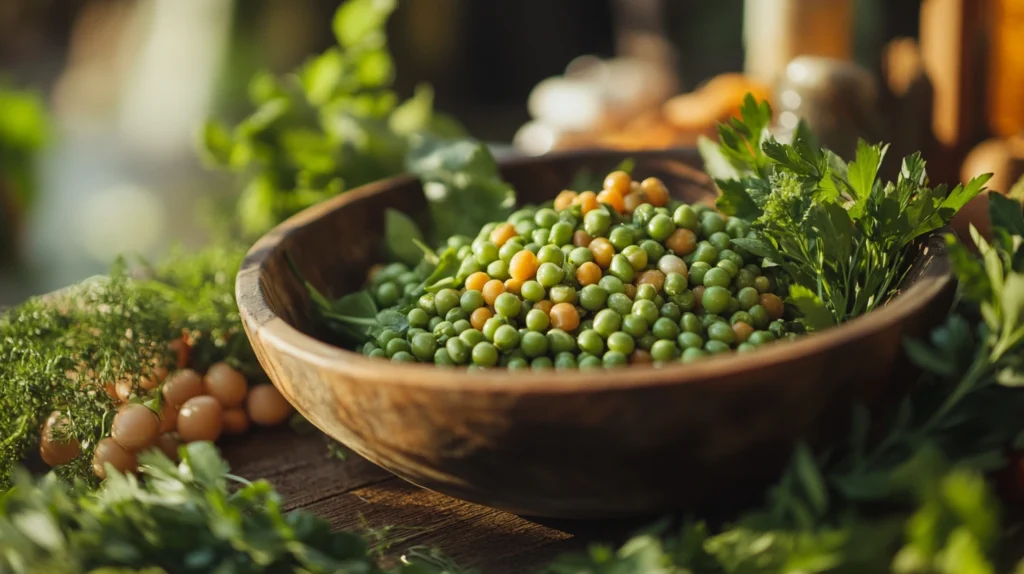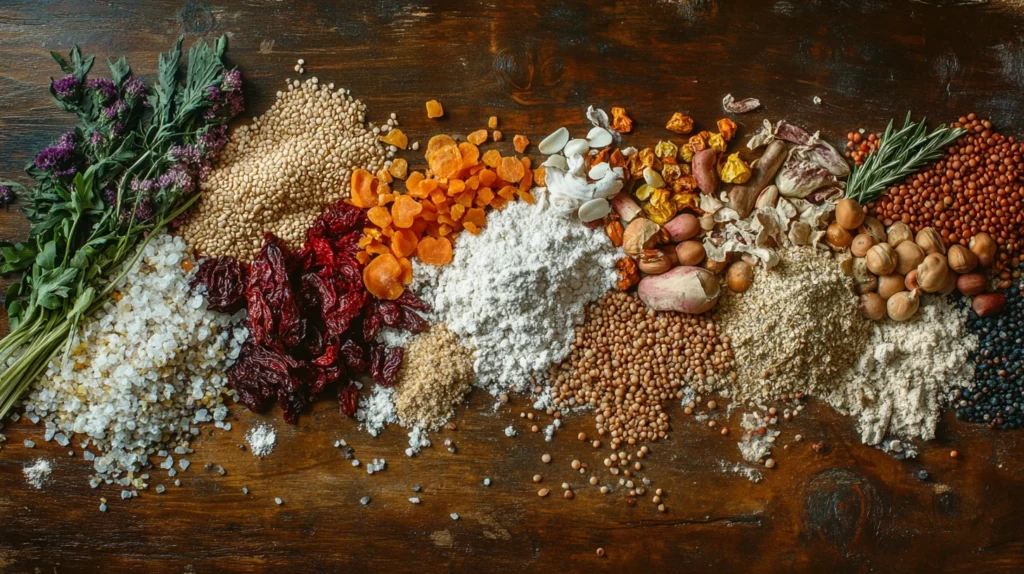Soup mixes are a culinary staple for creating hearty, nutritious meals that blend diverse flavors and textures. But have you ever wondered if Southern peas, a beloved ingredient in Southern cuisine, can take their place among the traditional legumes found in soup mixes? The short answer is yes! Southern peas, also known as cowpeas or field peas, are versatile legumes that can add unique depth and character to your soups.
This article will guide you through the world of Southern peas and their potential as a star ingredient in soup mixes. From understanding what makes Southern peas special to learning how to prepare and pair them with other ingredients, this comprehensive guide will ensure you have all the knowledge you need to create delicious, satisfying soups. Let’s dive into the world of Southern peas and explore their compatibility with soup mixes.
Table of Contents
Introduction to Southern Peas
What Are Southern Peas?
Southern peas, also commonly referred to as cowpeas or field peas, are a family of legumes that thrive in warm climates. They are part of the Vigna unguiculata species and are closely related to black-eyed peas. These legumes come in a variety of shapes, sizes, and colors, ranging from creamy white to deep purple. Southern peas have been cultivated for centuries due to their adaptability and nutritional value.
Popular varieties include:
- Crowder peas: Known for their slightly nutty flavor and creamy texture.
- Cream peas: Delicate and mild, making them versatile in dishes.
- Black-eyed peas: A well-known sub-variety often associated with New Year’s Day traditions in the U.S.
Southern peas are a staple in Southern cooking, offering a hearty, earthy taste that pairs well with a wide range of ingredients.
A Brief History of Southern Peas in Culinary Culture
Southern peas originated in Africa and were introduced to the Americas through the transatlantic trade routes. Over time, they became a cornerstone of Southern U.S. cuisine, particularly in rural areas where their resilience made them an invaluable crop.
In traditional Southern dishes, Southern peas are often slow-cooked with ham hocks, bacon, or other savory ingredients to enhance their natural flavor. Their ability to enrich stews, casseroles, and, of course, soups has made them a cherished component of regional cooking.
Beyond the South, Southern peas are increasingly appreciated for their versatility and nutritional benefits, appearing in modern recipes that emphasize plant-based and wholesome eating.
Nutritional Benefits of Southern Peas
Southern peas are not only delicious but also packed with nutrients, making them an excellent addition to any diet. They are:
- Rich in Protein: An excellent source of plant-based protein, making them ideal for vegetarians and vegans.
- High in Fiber: Promotes healthy digestion and keeps you feeling full longer.
- Loaded with Vitamins and Minerals: Particularly rich in iron, potassium, magnesium, and B vitamins.
- Low in Fat: A healthy choice for those aiming to manage their weight or maintain heart health.
The nutrient profile of Southern peas aligns perfectly with the needs of modern consumers seeking healthier, sustainable food options. Their combination of protein, fiber, and essential nutrients makes them a powerhouse ingredient in soup mixes and other meals.
By understanding the rich history, varieties, and nutritional advantages of Southern peas, we can better appreciate their potential as a key component in delicious and nutritious soup mixes.

Understanding Soup Mixes
Types of Soup Mixes
Soup mixes are pre-assembled combinations of dried ingredients designed to simplify the process of making soups. They can include a mix of legumes, grains, dried vegetables, herbs, and spices. Here are some common types of soup mixes:
- Legume-Based Soup Mixes:
- These typically include lentils, split peas, black beans, or chickpeas as the primary ingredient.
- They offer a protein-rich base, making them hearty and satisfying.
- Grain and Legume Mixes:
- Combinations of grains like barley, rice, or quinoa with legumes.
- These blends create a balanced meal by including both carbohydrates and proteins.
- Vegetable Soup Mixes:
- Focused on dried or freeze-dried vegetables such as carrots, onions, celery, and bell peppers.
- Often used as a quick and easy base for brothy soups.
- Seasoned or Pre-Flavored Mixes:
- Include dried herbs and spices to enhance the flavor.
- May also incorporate bouillon or seasoning packets for convenience.
Each type of soup mix has its own unique purpose and flavor profile, and they can all be customized to suit specific dietary preferences or tastes.
Key Ingredients in Soup Mixes
Soup mixes usually include the following essential components:
- Legumes: Provide protein, fiber, and a hearty texture. Examples include lentils, peas, and beans.
- Grains: Add bulk and balance to the soup. Barley, quinoa, and wild rice are common choices.
- Vegetables: Dried or dehydrated vegetables contribute flavor, color, and nutrients.
- Herbs and Spices: Enhance the soup’s aroma and taste. Popular options include parsley, thyme, bay leaves, and garlic powder.
The inclusion of legumes like Southern peas in soup mixes offers a unique twist, as their earthy flavor and creamy texture blend seamlessly with other ingredients.
The Role of Legumes in Soup Mixes
Legumes are often the star of soup mixes because they:
- Provide a Nutritional Boost: High in protein and fiber, legumes turn soups into balanced meals.
- Enhance Texture: Depending on the type, they can make soups creamy, hearty, or chunky.
- Act as Flavor Carriers: Absorb the spices and seasonings, enhancing the overall taste of the soup.
When considering legumes for soup mixes, Southern peas stand out as a versatile and flavorful option. They not only meet these criteria but also introduce a distinct taste profile that sets them apart from more traditional choices like lentils or split peas.
By understanding the components and types of soup mixes, it becomes clear that Southern peas can easily integrate into this culinary category, offering both nutrition and a unique character to your recipes.
Southern Peas in Soup Mixes: Compatibility and Use
Can Southern Peas Replace Traditional Legumes in Soup Mixes?
Absolutely! Southern peas are a fantastic substitute for traditional legumes like lentils, chickpeas, or split peas in soup mixes. Their versatility and nutritional profile make them a valuable addition to soups. Here’s why they work so well:
- Similar Cooking Times: Southern peas cook at comparable rates to other legumes, ensuring they blend seamlessly in a soup mix without requiring significant adjustments.
- Complementary Flavors: They have an earthy, slightly nutty taste that enhances the depth of soup recipes.
- Adaptability: Southern peas can be used in a wide range of soup styles, from creamy bisques to hearty stews.
Replacing traditional legumes with Southern peas can also introduce a fresh twist to classic recipes, providing a unique dining experience.
Flavor Profile: What Southern Peas Bring to Soups
The flavor of Southern peas is one of their most notable qualities. When used in soups, they:
- Add a mild sweetness that balances savory ingredients.
- Impart an earthy undertone that complements smoky, spicy, or tangy flavors.
- Pair well with aromatics like onions, garlic, and herbs such as thyme and bay leaves.
Their subtle yet distinct flavor ensures they enhance the overall taste of the soup without overpowering other ingredients. This makes them a perfect choice for balanced and harmonious dishes.
Texture Considerations When Using Southern Peas
The texture of Southern peas can range from soft and creamy to slightly firm, depending on how they are prepared. In soup mixes, their texture can be adjusted to suit the desired outcome:
- For Creamy Soups: Southern peas can be cooked until very soft and then blended to create a velvety base.
- For Chunky Soups: Cook them until tender but still intact, adding a satisfying bite to each spoonful.
Compared to traditional legumes like lentils, Southern peas hold their shape better, making them ideal for soups where texture is a key element. They also thicken the broth naturally as they cook, giving soups a hearty consistency.
Combining Southern Peas with Other Ingredients
Southern peas shine when paired with complementary ingredients in soup mixes:
- Smoky Flavors: Bacon, smoked turkey, or ham hocks.
- Herbs and Spices: Thyme, rosemary, paprika, and chili powder.
- Vegetables: Collard greens, tomatoes, carrots, and sweet potatoes.
By understanding how Southern peas function in soup mixes, you can unlock their full potential as a delicious and nutritious ingredient. Whether replacing traditional legumes or creating entirely new recipes, Southern peas are a versatile choice that enhances soups in unique and satisfying ways.

How to Incorporate Southern Peas in a Soup Mix
Preparing Southern Peas for Soup Mixes
To incorporate Southern peas into your soup mixes, proper preparation is key. Here’s how to get started:
- Sorting: Before using Southern peas, spread them out on a clean surface and remove any debris, stones, or damaged peas.
- Rinsing: Rinse thoroughly under cold running water to remove dust or dirt.
- Pre-Soaking (Optional):
- While Southern peas cook relatively quickly, soaking them for 4-6 hours or overnight can reduce cooking time and enhance their texture.
- If short on time, a quick soak method works well: boil the peas for 2-3 minutes, then let them sit in hot water for an hour before draining and rinsing.
Preparing Southern peas in advance ensures they cook evenly and integrate seamlessly with other ingredients in the soup mix.
Pairing Southern Peas with Other Ingredients
Southern peas are highly versatile and pair beautifully with a variety of ingredients in soup mixes. Here are some winning combinations:
- Grains:
- Pair with rice, barley, or quinoa for a hearty and balanced soup.
- Southern peas add creaminess to grain-based soups while complementing the texture of the grains.
- Vegetables:
- Combine with root vegetables like carrots and parsnips for a sweet and savory profile.
- Leafy greens like kale or collard greens add color, flavor, and nutrients.
- Herbs and Spices:
- Enhance with garlic, thyme, bay leaves, and a touch of smoked paprika for depth.
- Add a dash of cayenne or chili powder for a spicy kick.
- Proteins:
- Southern peas work well with smoked meats like ham hocks or turkey legs.
- For vegetarian soups, pair with plant-based proteins like tofu or tempeh.
Pairing Southern peas thoughtfully ensures they complement and elevate the other ingredients in your soup mix.
Recipes for Soup Mixes Featuring Southern Peas
Here are a few recipe ideas to inspire you:
- Hearty Southern Pea and Vegetable Soup
- Ingredients: Southern peas, diced tomatoes, onions, carrots, celery, thyme, and bay leaves.
- Preparation: Cook Southern peas until tender, then simmer with the vegetables and herbs for a rustic and flavorful soup.
- Southern Pea and Barley Soup
- Ingredients: Southern peas, barley, garlic, smoked paprika, and chopped kale.
- Preparation: Combine cooked peas and barley in a savory broth, finish with smoked paprika and fresh kale for a nutritious and satisfying dish.
- Spicy Southern Pea Chili
- Ingredients: Southern peas, kidney beans, tomatoes, chili powder, cumin, and bell peppers.
- Preparation: Cook the peas and beans together, then add the spices and vegetables for a zesty and hearty chili.
- Creamy Southern Pea Soup
- Ingredients: Southern peas, onions, garlic, vegetable stock, and cream (or coconut milk for a vegan version).
- Preparation: Blend cooked Southern peas with the stock and aromatics for a smooth, creamy soup.
These recipes highlight the versatility of Southern peas and their ability to shine in various styles of soup mixes, from rustic to refined.
FAQs About Southern Peas in Soup Mixes
Are Southern Peas Suitable for Vegetarian or Vegan Soups?
Yes, Southern peas are an excellent choice for vegetarian and vegan soups. They provide a rich source of plant-based protein and fiber, making them a great alternative to meat-based proteins. Paired with vegetables, grains, and herbs, Southern peas can create a hearty and satisfying vegan meal that’s both nutritious and flavorful.
Can You Use Dried Southern Peas in Soup Mixes?
Absolutely! Dried Southern peas are ideal for soup mixes as they store well and retain their nutritional value over time. When using dried peas, soak them beforehand to reduce cooking time and ensure a smooth texture in your soup. If the soup mix includes other dried legumes or grains, consider pre-soaking everything together for consistency.
How Do Southern Peas Compare to Black-Eyed Peas in Soups?
Southern peas and black-eyed peas are closely related, but they have subtle differences:
- Flavor: Southern peas have a more earthy and nutty flavor, while black-eyed peas are slightly milder and sweeter.
- Texture: Southern peas often hold their shape better when cooked, offering a firmer bite in soups.
- Versatility: Both work well in soups, but Southern peas can add a unique depth of flavor that sets them apart.
Do Southern Peas Require Pre-Soaking?
While pre-soaking is not strictly necessary, it is recommended for dried Southern peas as it:
- Reduces cooking time.
- Helps soften the peas for a creamier texture.
- Minimizes the risk of uneven cooking.
If you’re short on time, use the quick soak method (boiling the peas briefly and letting them sit in hot water for an hour) to achieve similar results.
Are Southern Peas Gluten-Free?
Yes, Southern peas are naturally gluten-free, making them a safe choice for individuals with gluten sensitivities or celiac disease. When incorporating them into soup mixes, ensure that all other ingredients (like seasoning packets or grains) are also gluten-free to maintain the integrity of the dish.
Where Can I Buy Southern Peas for Soup Mixes?
Southern peas can be purchased at:
- Local Grocery Stores: Often found in the dried beans and legumes section.
- Specialty Stores: Southern or international markets may carry a wider variety.
- Online Retailers: Websites like Amazon or specialty food retailers offer dried Southern peas in bulk.
Look for high-quality, organic options if possible, and store them in an airtight container to maintain freshness.
Southern peas, also known as cowpeas, are a versatile ingredient that can enhance various dishes. Incorporating them into your soup mix not only adds a unique flavor but also boosts the nutritional value. For a delightful twist, consider adding Southern peas to your Hearty Vegetable Soup, where their earthy taste complements the medley of vegetables. Alternatively, they can be a great addition to the Classic Minestrone Soup, providing an extra layer of texture and protein. For a more traditional approach, try them in the Southern Style Black-Eyed Pea Soup, where they can substitute or accompany black-eyed peas for a richer flavor profile.
Conclusion: The Versatility and Benefits of Using Southern Peas in Soup Mixes
Southern peas are a versatile and nutritious ingredient that can elevate any soup mix. With their earthy flavor, adaptable texture, and impressive nutritional profile, they bring a unique charm to soups, whether replacing traditional legumes or creating entirely new recipes. Whether you’re a seasoned chef or a home cook looking to try something new, Southern peas are an excellent addition to your culinary repertoire.
Their compatibility with various ingredients and cuisines ensures that they will remain a staple in kitchens worldwide, offering comfort and nourishment in every bowl.

